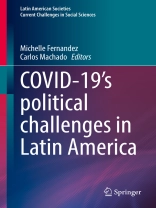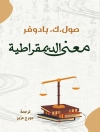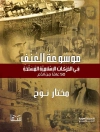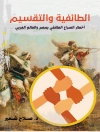This book analyzes how COVID-19 impacted politics and how politics shaped the response to the pandemic in Latin America, the region which has become the epicenter of the global health crisis started in China. The volume brings together studies carried out in eight countries of the region – Argentina, Brazil, Chile, Colombia, Ecuador, Mexico, Nicaragua and Uruguay – and show how the impacts and outcomes varied a lot across the region depending on the political processes under way in each country in the years preceding the pandemic and on the political responses adopted by each government to deal with the health crisis.
The volume is divided into four parts, each one dedicated to a specific dimension of the relation between politics and COVID-19 in Latin America. The first part is dedicated to denialism, and presents three case studies of governments that denied the importance of the health crisis: Brazil, Mexico and Nicaragua. The second part takes Uruguay and Colombia as two opposite examples of successful and failed state action against COVID-19. The third part analyzes how social movements faced the pandemic in Brazil and Chile. Finally, the fourth part analyzes how public opinion reacted to political responses to COVID-19 in four countries: Argentina, Brazil, Ecuador and Mexico.
COVID-19’s Political Challenges in Latin America will be a valuable resource for political scientists, sociologists and other social scientists interested in understanding how the pandemic affected politics and how politics affected the fight against the biggest health crisis faced by humanity in the last hundred years.
Innehållsförteckning
Chapter 1. Introduction: What are the political challenges of COVID-19 in Latin America?.- Part I: The deniers.- Chapter 2. Brazilian response to Covid-19: polarization and conflict.- Chapter 3. Mexico in the face of Covid-19: in between actions and inefficiency.- Chapter 4.Nicaragua: denying the health crisis and the political crisis.- Part II: State Action During COVID-19 Pandemic.- Chapter 5. Managing the pandemic in Colombia: between the immediate response and the structural consequences.- Chapter 6. The Uruguayan’s State’s structure and the management of the pandemic.- Part III: Social Movements and pandemic.- Chapter 7. Solidarity during the Pandemic: Creative Recombinations in Social Movement Frames and Repertoires.- Chapter 8. Transformative events and collective action in Chile during the Covid pandemic.- Part IV: Public opinion and pandemic.- Chapter 9. Presidential approval during the Covid-19 pandemic in Argentina.- Chapter 10. Identity versus fear of death: political polarization under the Covid-19 pandemic in Brazil.- Chapter 11. Between pessimism and mistrust: Ecuadorian attitudes in the 2020 coronavirus pandemic.- Chapter 12. “For the sake of all, the Poor First”: covid, mañaneras and the popularity of the mexican president.- Chapter 13. Conclusion: Comparing cases to understand the political challenges of COVID-19 in Latin America.
Om författaren
Michelle Fernandez is a Brazilian researcher and professor of Political Science at the Institute of Political Science at Universidade de Brasília (Ipol-Un B), Brazil, and a collaborate researcher at Oswaldo Cruz Foundation (Fiocruz/Ministry of Health), Brazil. She develops research in the areas of political institutions, health policy and bureaucracy.
Carlos Machado is a Brazilian associate professor of Political Science at the Institute of Political Science at Universidade de Brasília (Ipol-Un B), Brazil. He is the coordinator of the Flora Tristán Research Center and of the extension project “Ubuntu: Frente Negra de Ciência Política”. He develops research in the areas of political parties, electoral studies, race and politics and anti-racism.












